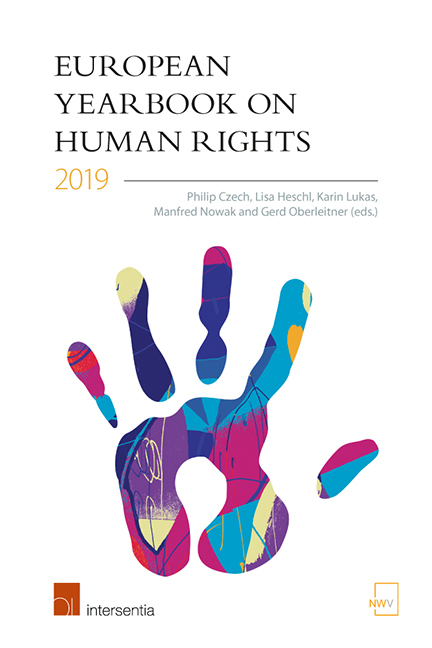Book contents
- Frontmatter
- Miscellaneous Frontmatter
- Editors’ Preface
- Contents
- List of Abbreviations
- List of Contributors
- PART I TOPIC OF THE YEAR
- PART II EU
- The Strange Case of Northern Ireland's Disappearing Rights in the EU-UK Withdrawal Negotiations
- Can Reasonable Accommodation Safeguard the Employment of People with Disabilities?
- Whistleblowing in Europe: A New Era of Legal Protections
- A Critical Take on Opinion 1/15: Is the Glass Half Full or Half Empty?
- Absolute Rightlessness Sur Place through Excessive Externalisation
- Corporate Accountability Mechanisms in EU Member States for Human Rights Abuses in Third Countries
- PART III CoE
- PART IV OSCE
- PART V REPORTS FROM THE FIELD
- PART VI OTHERS
- PART VII BOOK REVIEWS
- Index
Corporate Accountability Mechanisms in EU Member States for Human Rights Abuses in Third Countries
from PART II - EU
Published online by Cambridge University Press: 24 January 2020
- Frontmatter
- Miscellaneous Frontmatter
- Editors’ Preface
- Contents
- List of Abbreviations
- List of Contributors
- PART I TOPIC OF THE YEAR
- PART II EU
- The Strange Case of Northern Ireland's Disappearing Rights in the EU-UK Withdrawal Negotiations
- Can Reasonable Accommodation Safeguard the Employment of People with Disabilities?
- Whistleblowing in Europe: A New Era of Legal Protections
- A Critical Take on Opinion 1/15: Is the Glass Half Full or Half Empty?
- Absolute Rightlessness Sur Place through Excessive Externalisation
- Corporate Accountability Mechanisms in EU Member States for Human Rights Abuses in Third Countries
- PART III CoE
- PART IV OSCE
- PART V REPORTS FROM THE FIELD
- PART VI OTHERS
- PART VII BOOK REVIEWS
- Index
Summary
ABSTRACT
the right of access to a remedy for victims of corporate human rights abuses, enshrined in the third pillar of the UN Guiding Principles on Business and Human Rights, can be achieved through judicial and non-judicial mechanisms. this contribution aims to add to research in this field by focusing on the use of European Union (EU) Member States’ judicial mechanisms in claims involving human rights violations by EU-based companies in third countries. the contribution presents a mapping of all relevant legal proceedings brought before the courts of EU Member States. the mapping is based on a screening of specialised websites, existing mappings from other studies and a consultation of academic experts. On the basis of these sources the contribution makes an inventory of existing cases and provides key information on the company involved, the EU Member States in which the case takes place, the nature of the violation and the outcome. the contribution discusses the main implications of the findings in terms of the use of judicial instruments, the companies targeted, their outcomes and distribution across the EU.
INTRODUCTION
Unanimously endorsed by the UN Human Rights Council in June 2011, the United Nations Guiding Principles on Business and Human Rights (UNGPs) constitute the first authoritative global standard on business and human rights. the UNGPs are built on the ‘Protect, Respect and Remedy’ Framework and introduce three pillars in which action needs to be taken. the first pillar focuses on the State's duty to protect against human rights abuses, the second on the corporate responsibility to respect human rights and the third on the victims ‘right of access to effective remedy where their human rights have been harmed. the UNGPs specify that the latter can be achieved through judicial and nonjudicial mechanisms. this contribution complements research on the use and effectiveness of EU Member States’ judicial mechanisms to hold companies to account for human rights abuses in third countries. this focus on third countries is becoming increasingly relevant in a world economy characterised by a massive increase in trade in goods and service and a changed nature of trade.
- Type
- Chapter
- Information
- European Yearbook on Human Rights 2019 , pp. 157 - 186Publisher: IntersentiaPrint publication year: 2019
- 2
- Cited by



